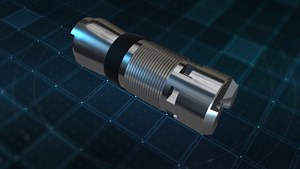BHGE introduces lightest, non-composite conventional frac plug
HOUSTON and LONDON -- Baker Hughes, a GE company has announced the introduction of its MILLITE lightweight frac plug, which mills out more smoothly and cleans up better than any other conventional frac plug on the market, cutting costs and helping customers achieve first oil faster.
Constructed completely of an engineered alloy material, the MILLITE plug does not contain any heavy metal or ceramic parts, making it the lightest conventional plug on the market. The plug’s wear- and preset-resistant design virtually eliminates preset risks, enabling safe run-in rates in excess of 600 ft/min (183 m/min). A field-ready wireline adapter kit simplifies assembly, and the plug’s proven friction-slip anchoring system and packing element keep it firmly anchored in the casing at pressures up to 10,000 psi (690 bar).
“The unconventional market requires continuous innovation to drive increased efficiencies and lower costs,” said Chris Johnson, product line director, BHGE Unconventional Completion Technologies. “The MILLITE plug’s unique lightweight alloy material offers something completely new to the industry to further accelerate post-frac interventions so that customers can start producing sooner.”
Transitions among composite, cast iron, and ceramic materials often cause rate of penetration fluctuations as each plug is milled, accelerating tool wear and, in some cases, necessitating extra trips. The plug mills more rapidly and more easily with less torque, helping to improve motor life and reduce drilling costs. With a specific gravity of only 1.8, the plug’s fine debris can float up and out of the well without the aid of additional cleaning sweeps or costly chemicals. At under 13 inches long, its compact design also contributes to a lower overall volume of debris per plug compared to standard plugs.
On a recent job, an operator in Colorado performing plug-and-perf completions used the lightweight frac plugs to minimize intervention time and reduce coiled tubing cycling costs. The well had a measured depth of 10,800 ft (3,292 m) and lateral of 4,400 ft (1,341 m), and the completion plan called for a total of 22 plugs to be set at regular intervals. The plugs were deployed at an average speed of 750 ft/min (229 m/min). After fracturing operations were complete, the plugs were milled without any motor stalls or short trips, and the average millout time was only five minutes per plug. The plugs milled out with significantly smaller cuttings, leaving minimal debris, which easily circulated out of the wellbore, without the need for specialty chemicals.



